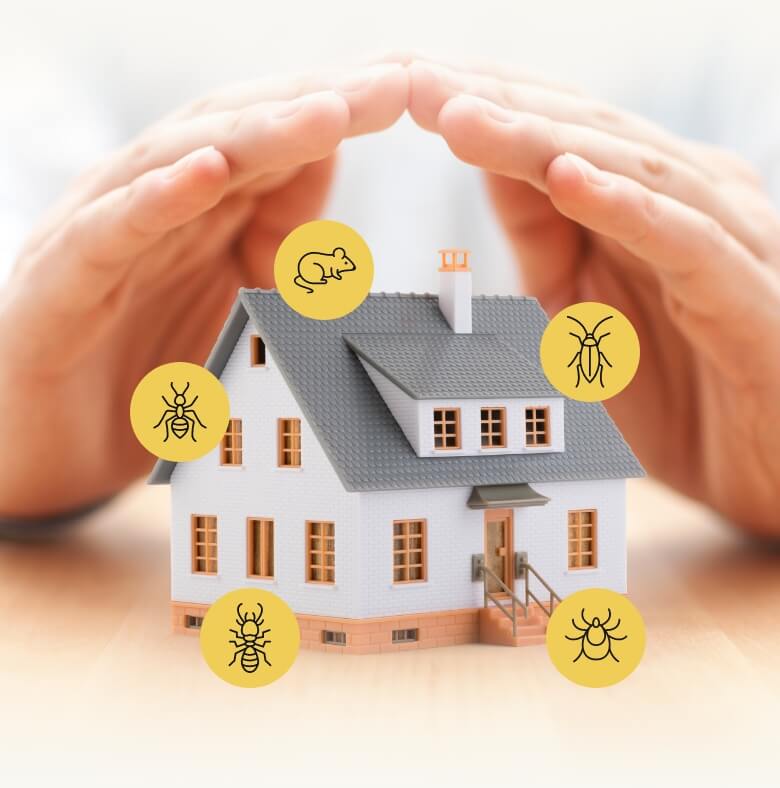Our Process
Here’s How We Do It
When you choose Yankee Pest Control, you choose a knowledgeable and experienced partner, who knows how to get rid of ants from your home or business. This is what you can expect from us.
Schedule an Appointment
Call us to schedule a convenient appointment for a thorough inspection.
Expert Inspection
One of our highly experienced technicians evaluates the problem. If we find ants, we create an ant control and monitoring plan that suits your budget.
Safe Remediation
Using the safest methods available, we begin remediation and continue until ants are gone.
Follow-up
We provide a detailed report of our findings and services and recommend any changes and/or improvements you can take to reduce a future ant infestations.

PEST MANAGEMENT BENEFITS
Health and Safety
Our effective pest management practices reduce the risk of disease transmission by controlling pests that can carry pathogens harmful to humans and pets.
Property Preservation
By controlling pests, you reduce the risk of structural damage to buildings, furniture, and other property, ensuring its longevity.
Peace of Mind
Knowing that your home or business is protected from pest-related issues provides peace of mind and a sense of security.
SAVE WITH HEALTHY HOMES
More Pest Protection. More Savings.
Choose one of our Health Homes Pest Management Plans and save.
ONE-TIME SERVICE
Single Pest Management
Starting at
$395/treatment
- We correct your single pest problem
- Guaranteed control, or we treat again at no additional cost
Best Value
SUBSCRIPTION
Healthy Homes Pest Management
Starting at
$445/year
- Year-round rodent control
- Year-round protection against 10-15 pests, depending on plan
- Customized Solutions
- Guaranteed control, or we treat again at no additional cost


Rodents carry diseases, damage property, and contaminate food, making effective pest control crucial to maintain a healthy and safe environment.
Cockroaches transmit disease, trigger allergies and asthma, contaminate food, water, and surfaces, create unpleasant odors and can even cause structural damage.
Ticks can transmit diseases, such as Lyme disease, Rocky Mountain spotted fever, anaplasmosis, and babesiosis, among others.
Termites can consume up to one pound of wood per day, and their damage can cause ceilings and floors to collapse.
Ants can become a nuisance as they invade homes, contaminate food, and potentially cause structural damage.
YEAR-ROUND PROTECTION
Healthy Homes Pest Management
Seasons aren’t the only things that change in New England – pests do too! Depending on the season, your home will play host to a variety of pests, from ants and crawling insects in spring and summer, to wasps in summer into fall, and mice and rats in winter.
Count on us
Why Yankee Pest Control
With years of experience in pest control, we’re your proven and trusted partner in keeping pests away from your home or business.
FAQs
Have a Question?
Does it mean you have a dirty home if you get ants?
While poor sanitation can attract ants, having a clean home doesn't guarantee immunity from ant infestations.
Ants are drawn to food sources, and even well-maintained homes can inadvertently provide access to crumbs, spills, or other attractive substances. Additionally, ants may enter homes in search of water or shelter. Regular cleaning and sealing potential entry points can help reduce the risk of ant infestations—regardless of the cleanliness of the home.
Can I get rid of ants myself?
There are some general steps you can take to get rid of ants:
Cleanliness: Keep your living spaces clean. Wipe up spills, seal food containers, and regularly clean crumbs and food residues.
Sealing Entry Points: Identify and seal entry points where ants may be coming into your home. This could include cracks in walls, windows, or doors.
Natural Repellents: Certain substances, like vinegar, lemon, cinnamon, or coffee grounds, can act as natural ant repellents. Sprinkle or place these items near entry points.
Baits: Use ant baits to attract and eliminate ant colonies. These baits typically contain slow-acting pesticides that the worker ants bring back to the colony.
Diatomaceous Earth: This powder, made from fossilized diatoms, can be sprinkled near ant trails and entry points. It is harmless to humans and pets but can be effective against insects with exoskeletons.
Boric Acid: Mix boric acid with a sweet substance (like sugar or honey) and place it where ants are active. The worker ants will carry it back to the colony, where it can eliminate the entire colony.
That being said, if the ant infestation is severe or persistent, or if you’re dealing with certain ant species, such as carpenter ants or fire ants, it’s advisable to consult with a professional pest control service for more targeted and effective solutions. Call Yankee Pest Services.
How often should I schedule pest control services for my home?
The frequency of pest control services for your home or business depends on factors such as your location, the severity of pest issues, and the type of treatment used. Yankee Pest Service treatment plans are designed to keep your home or business pest-free.
Are your pest control treatments safe for my family and pets?
Yes, our pest control treatments prioritize safety. We use environmentally friendly and pet-friendly solutions, ensuring the well-being of your family and pets while effectively eliminating pests from your home.
Is Yankee Pest Services a national brand?
No. Even though we offer the same type of service that national brands do, we are proudly a local New England company. We like to say we’re large enough to have all the tools necessary to solve any problem…and small enough to care about each customer’s needs.
Are your technicians licensed and trained in pest control best practices?
Yes, we are accredited by QualityPro— the pest management industry’s leading credentialing program. QualityPro sets the standards of excellence for professional pest management companies and accredited companies are on the cutting edge of professionalizing the industry.
Yankee Pest Control is proud to hold the following certifications and affiliations:
New England Pest Management Association (NEPMA)
National Pest Management Association (NPMA)
Entomological Society of America (ESA)
Service Disabled Veteran Owned Small Business



